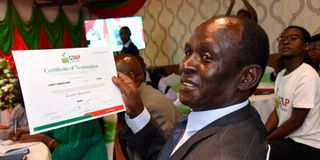Nominations: Parties opt for negotiations to avoid chaotic polls

Bomet gubernatorial aspirant on Gtap ticket Toweet Andrew Kibet displays his nomination certificate after receiving it from party leader Isaac Kalua on April 11, 2022.
The new law guiding the conduct of political parties has opened a window for the outfits to explore consensus and direct nominations, significantly changing the country’s political landscape.
President Uhuru Kenyatta’s Jubilee Party, his deputy William Ruto’s United Democratic Party (UDA), former Prime Minister Raila Odinga’s Orange Democratic Movement (ODM) and Mr Kalonzo Musyoka’ s Wiper Party are among those that have resorted to consensus in issuing direct tickets to aspirants.
Nominations chaos
Although this has not gone down well with some party members, the leaders are not leaving anything to chance as they try to ensure that there is no chaos in their parties.
Political analyst Martin Oloo has argued that the consensus method was a key avenue for parties —which he said often lack the financial muscle to carry out primaries across the country — to avoid the nominations chaos.
“No political party is capable of universal suffrage. It requires heavy financial investment. Even the IEBC [Independent Electoral and Boundaries Commission]electoral process is very expensive yet it’s the body mandated to undertake the exercise,” said Mr Oloo.
Unlike in the United States’ elections, Mr Oloo noted, parties in Kenya shoulder the cost of primaries as the public does not contribute to fund them.
“Our parties have meagre resources. The US parties have mechanisms where aspirants and candidates are financed directly by the people,” said Mr Oloo.
Mr Odinga recently brokered a deal among Homa Bay governorship aspirants that saw Woman Representative Gladys Wanga handed the ticket to be deputised by former MP Oyugi Magwanga.
This saw former Nairobi governor Evans Kidero ditch the ODM party and will now face off with Ms Wanga as an independent candidate.
The same applies to Siaya County, where the party has settled on Senator James Orengo edging out former Rarieda MP Nicholas Gumbo and former police spokesman Charles Owino, who have now joined Governor Ali Roba’s United Democratic Movement (UDM) as governor and running mates, respectively.
Hammer out a deal
The Mombasa governorship race pitting Mvita MP Abdulswamad Nassir and businessman Suleiman Shahbal is also in the works, as party chairman John Mbadi and Suna East MP Junet Mohammed are reported to have been tasked with the duty to hammer out a deal without a fallout.
Mr Shahbal has demanded that the party holds competitive nominations, trashing the use of opinion polls which the Orange party has cited as its reason for the decision to pick Mr Nassir over the 2013 and 2017 contestant.
DP Ruto’s UDA, on the other hand, has sealed many deals with aspirants, the latest being the Nairobi governorship seat, where Senator Johnstone Sakaja will now fly the party’s flag with his challenger for the ticket, former Starehe MP Margaret Wanjiru now settling for the senate seat.
Secret ballot
The DP has also made deals in Kakamega (Cleophas Malala), Tharaka Nithi (Muthomi Njuki), Nyeri (Mutahi Kahiga), Narok (Patrick Ntutu) and Kisii (Ezekiel Machogu), avoiding key races that would have pitted their allies against other politicians.
In the past, Kenyans have been treated to mlolongo system (queue voting) during former President Daniel arap Moi’s reign and later to secret ballot.
This was also the case even when the country tried secret ballot nominations, with the ODM task force on elections, chaired then by Catherine Mumma, returning a damming verdict, confirming that the polls were bungled.
The task force proposed direct nominations and that is why the party has been conducting opinion polls to establish who are the most favourites aspirants.
ODM Political Affairs Secretary Opiyo Wandayi defended the party’s decision to avoid competitive nominations.
“The methods are in the party’s constitution and the nomination rules submitted to the IEBC. What the party is doing is perfectly in order. Our decisions are not haphazard or arbitrary but carefully considered and evaluated,” said Mr Wandayi.
Both Jubilee and ODM have suffered setbacks in past elections, where the leadership was accused of favouritism and issuing tickets to unpopular aspirants, as well as some being bribed.
Jubilee Director of Elections Kanini Kega said the party has taken the route to seek consensus, engage eminent persons and direct nominations.
“We are opting for negotiated democracy. In places where we might not have physical presence, we engage the leaders,” said Mr Kega.
He disclosed: “I have met with the Nyeri County aspirants where we formed teams of eminent persons to spearhead the negotiations. This route will forestall political fallouts.”
Mr Kega said nominations are a cut-throat competition, which usually has repercussions.
“This route is less injurious, with less possibility of conflict and ends in a win-win situation. Competitive nominations end in a winner-loser situation. With the negotiations, we provide the aspirants with an opportunity settle on other promises by the party, like state jobs.”
He added: “This is less tedious and not costly.”
Jubilee Secretary General Jeremiah Kioni had announced that the party will engage in consensus to avoid political fallout that could hurt the party’s chances during the elections.
Section 38(A) of the Political Parties Act provides that a political party shall use direct or indirect nomination to conduct its primaries.
“When conducting party nominations, a political party shall use establish mechanisms for the resolution of disputes arising out of nominations. A registered member of the party shall be entitled to nominations conducted by a political party,” reads part of the law.
Indirect nomination is defined as the process by which a political party uses delegates selected from amongst its registered members to select its candidates.
Parties have until April 28 to submit lists of all aspirants for the various elective seats.





